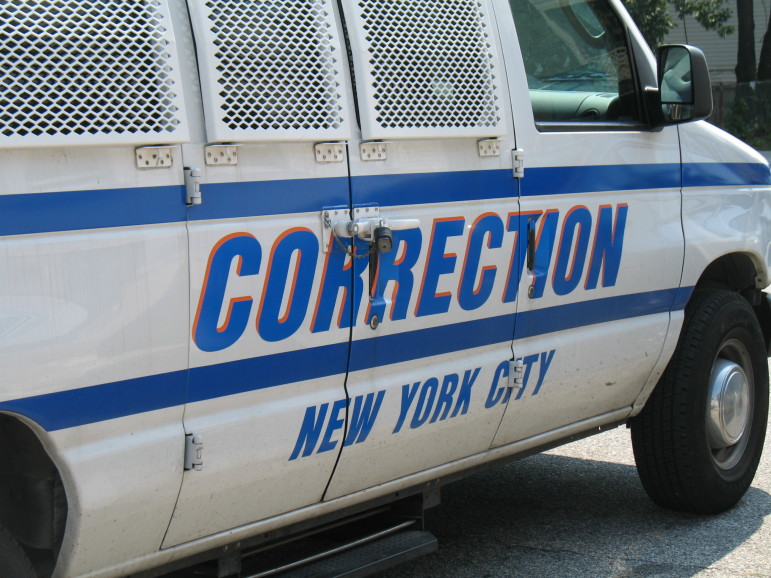‘Our new mayor should know solitary confinement does not curtail violence in jails, decarceration does. The people of New York deserve so much better than a limited imagination of this former cop who knows people will die from this policy.’

Jarrett Murphy
A Department of Correction vehicle, used to transport people to Rikers Island.This year alone, 16 people have died on Rikers Island, and many more are already inhumanely isolated. Mayor Eric Adams stated last month that on day one of his new administration, he would reinstate punitive segregation, also known as solitary confinement, which is torture and will only add to the humanitarian crisis on Rikers.
To anyone paying attention, it’s become clear that the U.S. prison system is inadequate. But even within this system, solitary confinement makes it worse.
Solitary confinement is the prison system’s worst torture device, and it is used all too frequently. Most repugnant of all is the fact that the specter of COVID-19 is giving prison officials cover to more freely deploy solitary confinement tactics, laughingly in the name of safety.
Solitary confinement does not belong in a civilized society. First, the worst excesses must be outlawed, but steps must be taken to eliminate solitary confinement outright. There’s no place for it in a fair justice system.
With prisons overcrowded and often unsafe due to the poor environment and care for prisoners, studies have found that officers who work in chaotic and hostile work environments are more likely to use retaliatory measures—including unfair use of solitary. Now, prisoners desperate to feel safe from COVID are punished for trying to avoid picking up the deadly virus.
This is wrong. The World Health Organization, the United Nations and other international bodies have recognized solitary confinement as significantly harmful and potentially fatal. The National Commission on Correctional Health Care issued guidance to correctional health officials back in 2016 and identified a period of confinement beyond 15 consecutive days as “inhumane, degrading treatment, and harmful to an individual’s health.” This guidance is in reality ignored, but the consequences are real.
Young people under 21 are one of the most vulnerable groups that must be legally protected from overuse of solitary in any situation—along with people older than 55, pregnant women and those in postpartum recovery, or individuals with disabilities and chronic mental illnesses.
For young people and children who are by nature at a key stage of development, isolation can lead to permanent psychiatric effects and symptoms. Older people suffer increased risk of, or worsened symptoms of, chronic conditions like Alzheimer’s or heart disease. Pregnant women are more likely to develop infections or miscarry due to extreme stress caused by isolation, while postnatal women are prone to developing postnatal depression.
Meanwhile, people living with disabilities or mental illness are more vulnerable to the effects of isolation, but also more likely to end up in solitary as under-trained staff struggle to cope with their care. The Kalief Browder tragedy speaks to this horrible truth: the mental anguish caused by this awful practice—especially on young people—is clear.
New York legislators passed HALT Solitary Confinement, but we need to take steps to eliminate solitary confinement outright because our people are calling for care rather than cruelty.
Our new mayor should know solitary confinement does not curtail violence in jails, decarceration does. The people of New York deserve so much better than a limited imagination of this former cop who knows people will die from this policy. We must protect people from the anguish of solitary immediately and I’m calling on business leaders to gear up for a fight toward stopping the inhumane practice.
Ashish Prashar is a justice reform campaigner, who sits on the board of Exodus Transitional Community, Getting Out and Staying Out, Leap Confronting Conflict and the Responsible Business Initiative for Justice and is a fellow at the Royal Society of Arts.









One thought on “Opinion: NYC Deserves Better Than a Mayor Who Supports Solitary Confinement”
Ceo Renee Mitchell of Breaking The Cycle Drop Corp. Said how we can improve prison . Reduce inmates idleness by Increasing opportunity like exercise, sports, cultural religious, vocational training,trades ,college,ged classes, ,mental health and substances abuse program. Active inmates are less likely to feel stress and hostile.claffify and housed inmates according to their level of risk ,lower risk groups require less security and can be manage on a lower security basis.